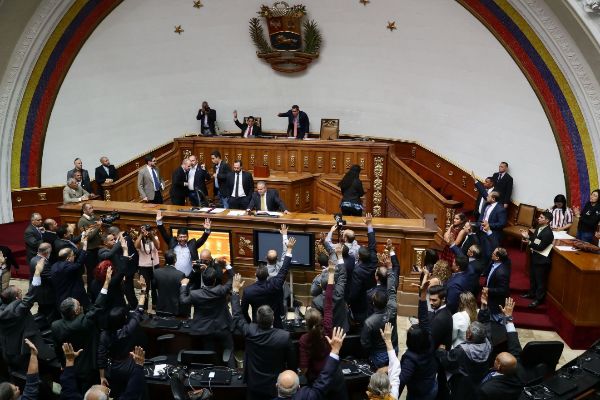- Venezuela: Chavismo withdraws immunity to four opposition deputies and accuses them of treason
The democratic Parliament has counterattacked this afternoon (Spanish night) to prevent revolutionary maneuvers from breaking the opposition challenge against Nicolás Maduro. With the vote of the 93 deputies present from the 167 elected in 2015, the National Assembly (AN) has reformed its Rules of Interior and Debate to allow deputies exiled by the "political persecution" to vote in legislative sessions and in the meetings of the different parliamentary commissions.
The decision seeks to shield the re-election of Juan Guaidó as president of Parliament on January 5, for which he needs a quorum of 84 parliamentarians present in the Hemicycle. In just three days, Chavismo has ordered the capture of two deputies and violated the immunity of four others.
"In those cases of deputies or deputies who because of political persecution or other force majeure cannot attend in person, this duty may be fulfilled by non-contact mechanisms that use information and communication technologies," says the reform of the regulation .
The maneuver, which is transcendental because 31 deputies are exiled in different countries, will obtain an urgent response from the Supreme Court of Justice (TSJ), the judicial deck of Chavismo that moves from the Miraflores Palace. This was announced by his parliamentary group after leaving the Plenary before the vote. His thesis is that a public office cannot be exercised from abroad. On the other hand, Hugo Chavez himself ruled from Cuba during weeks 2012 and 2013 because of the cancer he suffered.
This year alone, the almighty National Constituent Assembly, created by Maduro to de facto replace Parliament, has broken the parliamentary immunity to 24 opposition legislators, including Guaidó, leaving them at risk of being imprisoned.
"With today's decision we recover our rights as parliamentarians. The deputies in exile will have a vote from abroad, which will reinforce the victory of President Guaidó and the only legitimate instance that the country supports," congratulated Luis Florido from his exile in USA.
"Thanks to this legitimate modification, I will participate in the election of the new directive. This is a victory over the atrocious persecution of the mature regime and its hamponil TSJ," said Germán Ferrer, dissident revolutionary deputy, exiled in Colombia.
The decision of the majority block of Parliament leaves, however, several loose ends. The first is around the figure of the deputy deputy, responsible for replacing the holder when he is not. And the second, questions the participation of deputies who hold public office, since the regulations prevent them from remaining as such when they are appointed to other bodies. Several opponents today hold relevant positions in the organizational chart of the presidency in charge.
The Chavista deputies were not the only ones absent from the Hemicycle. Both the deputies who are investigated for favoring Chavista millionaires and the representatives of the radical right did not occupy their seats. Neither did the deputies who support the supposed Dialogue Table between the government and opposition groups, including Timoteo Zambrano, the closest opposition politician to the former president of the Spanish government, José Luis Rodríguez Zapatero.
According to the criteria of The Trust Project
Know more- Nicolás Maduro
- Supreme Court
- José Luis Rodríguez Zapatero
- Juan Guaidó
- Hugo Chavez
- Venezuela
Venezuela Juan Guaidó rescues a deputy besieged by military counterintelligence
Venezuela 'Green briefcase operation' against Juan Guaidó
Venezuela Chavismo withdraws immunity to four opposition deputies and accuses them of treason

